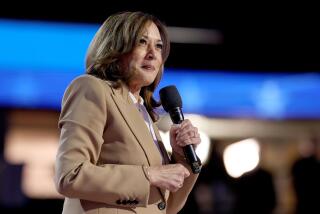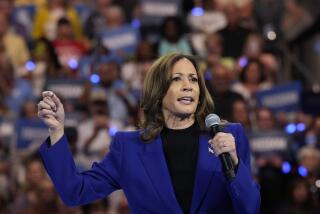Candidates’ Efforts Clicking on the Net
WASHINGTON — Since the beginning of the 2000 presidential race, the Internet has been a cool electioneering tool, used by campaigns to recruit volunteers, solicit contributions, spread candidates’ messages and even get voters to the polls. But now the Internet is flexing its newly developed political muscle, potentially transforming the way Americans select their president.
Ten days ago, Sen. John McCain was a cash-poor underdog. Political pundits were forecasting an early demise to his campaign because of the overwhelming financial advantage held by front-runner George W. Bush.
But since McCain’s stunning landslide victory in New Hampshire, his campaign has raised more than $2.2 million online, giving him an immediate infusion of cash that is not only keeping his campaign alive but is changing the Arizona Republican’s status from that of maverick longshot to serious contender.
It is because of the Internet and its instant capacity to turn the click of a mouse into the ka-ching of the campaign cash register that McCain now is giving Bush a run for his money. Fred Wertheimer, president of Democracy 21, a nonpartisan public policy organization, calls McCain’s cyber-bonanza “the first big breakthrough example of how the Internet can affect elections in this country.”
“I expect there will be many more to come, even though it may take a few years to get there,” he added.
Raising money is only one way candidates are using the Internet to affect the political process and their place in it. When a handful of Al Gore’s campaign staffers arrived in Minnesota after the New Hampshire primary, 1,000 volunteers who had been recruited online were ready to “hit the ground running,” says Ben Green, director of Internet operations for the Gore campaign. And to ensure a good turnout at his event in St. Louis on Wednesday, Democrat Bill Bradley’s campaign sent e-mail messages to all its online supporters living in nearby ZIP Codes.
Indeed, McCain’s Web site is not the only one heating up as the election kicks into gear. Last week, Bradley’s site received three times as many visitors as in the typical week in January, and two to three times as many people have been using Gore’s Web site over the last few weeks than in the previous few months.
The great appeal and impact of the Internet--particularly but not solely to shoestring campaigns--is that it is cheap, fast and has no geographic boundaries.
“The Internet is radically changing politics generally and particularly fund-raising,” said Phil Noble, founder of PoliticsOnline, a Charleston, S.C.-based firm that consults and provides products for Internet politicking. “It takes everything a campaign does--fund-raising, phoning, field work--and combines them all in one place,” he added.
“Listen, you can’t take a bum candidate and make him a star with the Internet,” Noble conceded. “But you can take a guy who has the makings of a star and help him along with the Internet. It’s just ideal for connecting people all at one place at one time.”
This also makes the Internet an excellent organizing tool. The Gore campaign is in regular contact with 100,000 e-mail supporters, and the McCain campaign used 1,700 members of its large online community from around the country to each call 10 New Hampshire voters, thus erasing the barriers of geography, time and money.
All the major campaigns reported that their Web sites are drawing new and younger people into the political process.
The Gore team has significantly beefed up attendance at its GoreNet events--$35 fund-raisers aimed at the younger crowd--by advertising them and selling tickets on its Web page and sending e-vites (e-mail invitations) to online supporters.
About 60% of McCain’s online donors are under 45 years old, and 40% of them have never contributed to a political campaign before, said Tom Hockaday, whose firm Campaign Solutions supplies advice and software for the campaign’s online efforts. Republicans who contribute by mail tend to be over 60, he added.
But what makes McCain’s recent fund-raising success particularly noteworthy is its potential to change a historical pattern. In past campaigns, outsider candidates who experienced unexpected success in early primaries were unable to capitalize on them because their tiny campaign coffers prevented them from competing in the same ballpark with a presumptive nominee.
Money dribbled in from traditional sources--direct mailings and gala events--but not fast enough to enable the quick-bloom candidates to ride the wave of their surprise successes.
The classic case is Gary Hart in 1984. Hart trounced Walter Mondale in New Hampshire, but didn’t have the cash to respond to the well-financed campaign of the former vice president, the choice of the Democratic Party establishment.
“I can remember in the week after New Hampshire I must have opened up dozens of envelopes that came into my office, unsolicited mailings that added up to $20,000 to $25,000. For people to do that they had to know who I was, find my address, get a stamp, write the check, which I then had to deposit,” said John Emerson, Hart’s California campaign manager, now an investment manager in Los Angeles. “Can you imagine how much more there would have been if all they had to do was go to a Gary Hart Web site?”
With the success of McCain’s Internet operation, no imagination is necessary. The Web site is tailor-made for freshly smitten supporters and impulse buyers. In the last week, more than $2.2 million in online, credit-card contributions have poured in and McCain’s interactive community--a months-old group of people in e-mail contact with his campaign--has swelled from 60,000 to 86,000.
The post-New Hampshire online funds are already being used, among other things, to fund ad campaigns in the upcoming primary states of Michigan and Arizona, said Max Fose, McCain’s Internet manager.
And while responses to the campaign’s morning-after 200,000-piece mailing are just starting to trickle in, “the Internet has given us the ability to capitalize instantaneously,” Fose said.
Other candidates’ Web sites also solicit funds, but none has been as successful as McCain’s. For one thing, they haven’t needed to try as hard. For another, his site is very “in-your-face” about asking for money, said Hockaday.
The campaign has also tried to use other Internet techniques to raise money. When it sends out e-mails asking McCain supporters for money, it also asks each of them to e-mail 10 of their friends and associates asking them for money too, Fose said.
And this evening, McCain will hold an online fund-raiser, dubbed the “cyber express,” with 500 supporters who each have donated $100. McCain will give a talk and then answer questions from donors--all online.
The Gore, Bradley and Bush campaigns, meanwhile, all stressed that fund-raising is a secondary priority for their Web sites.
Texas Gov. Bush, who has raised nearly $70 million overall, has received only $350,000 in online contributions to McCain’s total of more than $3.7 million.
“Internet contributions are definitely a component of the Web site but not the No. 1 driving force,” said Bush’s e-campaign manager, Greg Sedberry.
While Bush’s Web site features a calculator that visitors can use to determine how the candidate’s tax proposal would affect them, the Gore and Bradley sites are focused on reaching undecided voters.
“What we really wanted our site to do this past week and all the way through March 7 is less fund-raising and more volunteer-raising and attention-raising for Bill Bradley,” said Lynn Reed, his Internet consultant.
Cyberspace Contributions
All four major presidential candidates have used their Web sites to raise campaign cash, but for Sen. John McCain, the cyber-contributions have been a critical element of his challenge to Texas Gov. George Bush.
*--*
Candidate Total Online Online Contributions* Contributions** Percentage John McCain $13,614,814 $3.7 million 26.4% Bill Bradley $27,523,602 $1.5 million 5.4% Al Gore $30,977,409 $1.1 million 3.6% George W. Bush $67,770,229 $350,000 0.5%
*--*
* As of Dec. 31, 1999
** Online contributions for campaigns other than Bradley’s include those raised in 2000.
Source: Campaign Study Group, presidential campaigns
Compiled by SUNNY KAPLAN/Los Angeles Times
*
Times staff writer Geraldine Baum contributed to this story.
More to Read
Get the L.A. Times Politics newsletter
Deeply reported insights into legislation, politics and policy from Sacramento, Washington and beyond. In your inbox three times per week.
You may occasionally receive promotional content from the Los Angeles Times.










